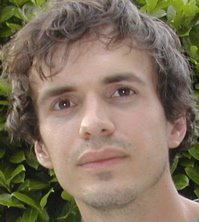I've mentioned before that I'd like to encourage other deaf/hoh people to apply for Fulbrights. I've been told by the Fulbright Commission that they are actively encouraging Americans with disabilities to apply. Last summer, before starting my project, I met Molly Lubin, a deaf/hoh Fulbrighter who had just finished her project in India. She has graciously allowed me to post a brief on her project. Molly focused on a more auditory rehabilitation-based approach, while I have focused more on sign language and deaf culture. I think both approaches have much to offer.
"During a nine-month Fulbright Scholarship in India, I set out to explore the ways in which Indian society was addressing the needs of hearing impaired children. This included research into available auditory therapy, hearing technologies, and parental counseling. I focused mostly on the parents of these young children, since it is they who invest the most money, time, and energy into dealing with the hearing impairment. I based myself in New Delhi but also spent a month each in Mumbai and in Kalimpong, West Bengal, where I interviewed parents and also gained a broader sense of the country.
I spent extensive time at private auditory clinics for the hearing impaired, at the state-run auditory training institute and clinic for the deaf, and at an NGO for hearing-impaired children. My research showed that parents of all socio-economic groups experience difficulty as they attempt to help their child, but that this was especially true, not surprisingly, for low-income parents. For this group, the problem begins with obtaining a diagnosis of hearing loss, as physicians in the overcrowded and under-funded government hospitals often tell parents that a deaf child is merely slow, or is experiencing a mild ear infection that will go away. Because the parents are relieved to hear that the problem is only temporary, they rarely press for more testing. As a result, children are often of school-age by the time they are diagnosed. At this point, parents and doctors have already squandered crucial years of the child’s language development.
Once the reality of hearing loss sets in, parents must begin the struggle to obtain viable hearing aids and auditory therapy. Many parents in Delhi, especially those who are illiterate or speak neither Hindi nor English, never learn of the existence of the state-funded National Institute for the Hearing Handicapped, which can provide both aids and sessions with an audiologist, free of cost. Often, however, even this is not enough. Through a volunteer association of American women that supported a charitable school in a slum area, I learned of a 12-year old boy who seemed to have profound hearing loss, at the school of three-to-five year olds. His father had died years ago and his mother was a rag-picker. His hearing loss had never been medically confirmed and his mother had not known how or where to seek professional help. Along with other volunteers, I took this boy to the National Institute where, after days of waiting, he was examined and fitted with hearing aids.
Unfortunately, utilizing the free services at this Institute will not solve a low-income family’s problems. The hearing aids that he received were of low quality and hardly functional; the free auditory therapy lasted for an insufficient period of time. The son of the rag-picker received therapy only for a month. This was hardly enough to make amends for a lifetime of no hearing. Gaining little benefit from his hearing aids, he now no longer wears them.
One NGO in Delhi called Suniye (Hindi for “Hear!”) provides additional language and listening training to hearing impaired children, the majority of whom come from indigent families. I observed all of the 30 children who were enrolled in Suniye at the time. Out of 14 sets of parents whom I interviewed in depth, ten reported a monthly income of less than USD $130. The children of these ten sets of parents had all received their hearing aids from the National Institute. Despite their good fortune in obtaining additional services at Suniye, these children could barely speak and relied solely on lip reading, as they wore hearing aids so limited in function.
I organized a conference in Delhi for parents of hearing-impaired children and for professionals in this and related fields. Over 50 people attended the conference, many of them parents from disadvantaged backgrounds. The primary purpose of the conference was to bring together parents and professionals, and to let them discuss common issues, questions, concerns, and areas of miscommunication. Several parents delivered talks on difficulties that they had had in obtaining correct diagnoses, learning to accept their children’s hearing impairment with little or no emotional support available, and gaining school admission for their child. Group discussions at the conference focused on ways of increasing parent’s knowledge of services available to their child, ways of raising awareness of hearing impairment among primary care physicians, government, and society at large, and ways for working to lower the cost of hearing technologies.
In addition to giving a presentation at this conference, I delivered various talks on my research findings throughout the course of my time in India. I spoke to a group of western anthropologists at the International Trust for Traditional Medicine in Kalimpong, to 150 Pakistani college students at the Quaid-e-Azam University in Islamabad, to a group of Indian scholars at a Delhi-based research institute, the Centre for Study of Developing Societies, and to students undertaking a training program in audiology at the National Institute for the Hearing Handicapped. Raising awareness consists of helping society to understand the needs and capacities of hearing impaired people, and helping the hearing impaired find paths to successful lives and thus become advocates for other hearing impaired individuals."
Subscribe to:
Post Comments (Atom)

No comments:
Post a Comment